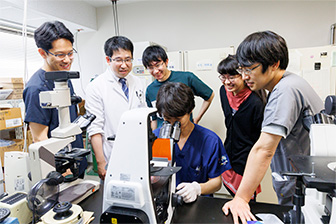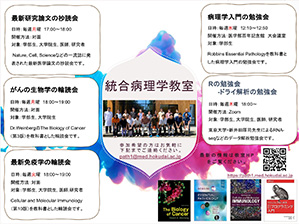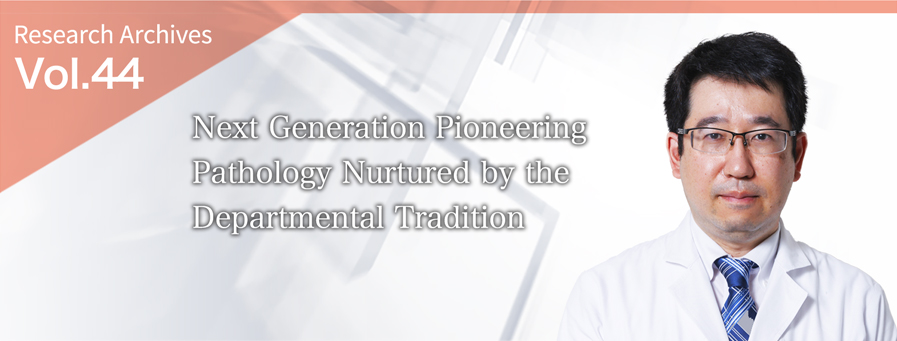
Department of Pathology, Graduate School of Medicine, Hokkaido University
Koji Taniguchi M.D., Ph.D.Pathological Science
Academic & Professional Experience
- 1994–2000 M.D. course, Department of Medicine, University of Tokyo, M.D. awarded 03/2000
- 2003–2007 Ph.D. course, Department of Surgery and Science, Graduate School of Medical Sciences, Kyushu University, Ph.D. awarded 03/2007
- 2009–2016 University of California, San Diego, USA
- 2017– Associate Professor, Keio University School of Medicine
- 2021– Professor, Faculty of Medicine and Graduate School of Medicine, Hokkaido University
Cutting-edge research of cancer and tissue regeneration based on inflammation
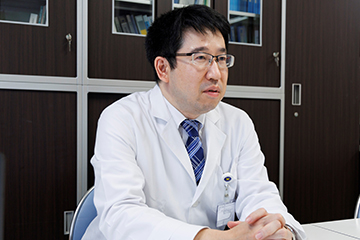
Our department has an extensive history spanning more than 100 years since the Department of Pathology was established in 1921, two years after the founding of the School of Medicine during the Hokkaido Imperial University era. Professor Yutaka Kon, the first professor of the department, was also the first person from the School of Medicine to be appointed President of Hokkaido University, and his bust is in front of the School of Medicine. Professor Katsuo Takeda, the second professor of the department, is famous as the first researcher in Japan to start research on anti-tumor immunity, and the numerous research results Dr. Kon and Dr. Takeda have since achieved form the basis of our current research themes. In addition to research and education, our department is also in charge of pathology autopsies at Hokkaido University Hospital.
“Our research incorporates new perspectives and cutting-edge analytical methods building on our rich tradition,” says Professor Koji Taniguchi, the sixth professor of the department.
The name of our department was “Molecular Pathology” until FY 2022, but was renamed “Integrative Pathology” in April 2023. “The main reason for this change in name is that research methods have changed rapidly in recent years,” Professor Taniguchi says. “Previously, pathology mainly focused on research and diagnosis of one to a few molecules, but it has recently become possible to comprehensively analyze tens of thousands of molecules at once, enabling research and diagnostics that integrate large amounts of information. I believe that classical morphology and molecular-level research and diagnosis alone are outdated, and that a multifaceted, broad-based approach will become increasingly important in future pathology research and diagnosis, such as the integration of molecular-level information with cell, tissue, organ, and individual-level information; the integration of morphology with biochemistry and molecular biology; the integration of experimental and human pathology; and the integration of basic and clinical medicine. I would also like to actively integrate my research areas of inflammation/immunity, cancer, regeneration, and aging with other research fields.” Our department is not particular about the research methods, but rather seeks to produce research results by using all possible research methods to achieve its research objectives. As a pathology department, it also values morphology, and our department is also actively conducting state-of-the-art spatial transcriptomics.
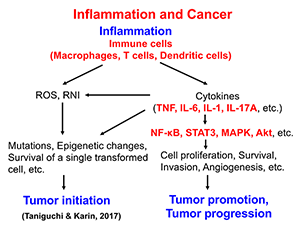
tissue regeneration
Professor Taniguchi’s areas of expertise include pathology, immunology, molecular oncology, and gastrointestinal surgery, and the Department of Pathology is currently engaged in advanced research on the topics of “inflammation and cancer” and “inflammation and tissue regeneration.” Inflammation is a complex phenomenon with two facets: acute and chronic inflammation. Acute inflammation is beneficial inflammation that defends against infection and induces tissue regeneration, while chronic inflammation is disadvantageous inflammation that is involved in the development and progression of almost all diseases, including cancer. Professor Taniguchi says, “There are still many aspects of inflammation that are not well understood, including the difference between acute and chronic inflammation, and I believe that basic research on inflammation is still important for the development of cancer therapies targeting inflammation.”
The keywords of research in our department are “inflammatory memory” and “tumor-elicited inflammation.” Inflammatory memory is a phenomenon in which immune cells and tissue stem cells have a memory of inflammation caused by past infection or injury, and respond rapidly to the next infection or injury based on this memory, the mechanism of which is not fully understood. Tumor-elicited inflammation, however, is a type of inflammation in which tumor cells themselves induce inflammation in the absence of inflammation through genetic mutations, thereby promoting cancer, and plays an important role in cancers that are not associated with apparent infection or inflammation, which account for approximately 80% of cancers. Professor Taniguchi studied in the laboratory of Professor Michael Karin, who is famous for his research on inflammation and cancer, at the University of California, San Diego, USA for about eight years from 2009. He has continued with research on inflammation and cancer as well as inflammation and tissue regeneration mainly in digestive organs such as the colon and liver, and has published many original research papers and reviews. In the field of colon regeneration research, he was the first in the world to discover the Src family kinase (SFK)-YAP pathway as a signaling pathway linking inflammation and tissue regeneration. Inflammatory memory research is a developmental study he started after returning to Japan and that arose from previous research on inflammation and tissue regeneration. In the study of colorectal cancer, he proposed the concept of tumor-elicited inflammation caused by the cancer cells themselves and clarified its importance and mechanism through many experiments. Based on these results, he is currently working on the development of novel cancer therapies targeting tumor-elicited inflammation. He hopes to continue his research on cancer and tissue regeneration based on inflammation and to disseminate research results that will change conventional concepts.
Providing not only a cutting-edge research environment, but also a place to learn and experience personal growth towards the future
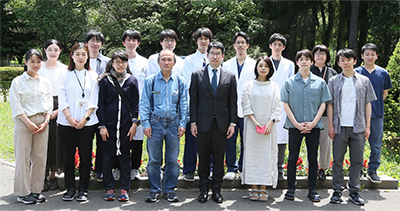
At present, our department consists of four faculty members, six graduate students, seven undergraduate students, two technicians, and a secretary. The atmosphere in our department is very open and conducive to spontaneous research. In addition to research, our department also emphasizes academic learning through reading sessions of the latest papers, study groups using textbooks on cancer and immunology and a study group on data analysis using R.
Professor Taniguchi says, “Research results and findings on cancer and immunology have been systematized to quite an extent. Textbooks are also well prepared, making the environment very conducive to study. With the development of cancer immunotherapy, knowledge of cancer and immunology is becoming increasingly important in clinical practice, and it is of great significance to study cancer and immunology in depth during the graduate and undergraduate years. Many of the physicians in our department have entered graduate school from clinical departments. As in my own case, it is difficult to learn about other fields than one's own specialty, especially basic medicine, when one is in clinical practice, but graduate students in our department can learn about cancer and immunology from a broad perspective that transcends the boundaries of medical departments. I believe that you will grow a lot by acquiring the latest medical knowledge through study group sessions, learning how to think scientifically, and engaging in friendly research competition with your colleagues. I also believe that how to give presentations and write papers is an important skill to learn in graduate school, so I put a lot of effort into educating students in this area as well.”
Our department actively provides support for overseas study, conference presentations, and obtaining of research funding. It is also possible to study at the graduate school while aiming to become a pathologist, and receive basic training in both experimental pathology and human pathology under the guidance of Dr. Satoshi Tanaka and Dr. Sari Iwasaki, and also at affiliated facilities such as Sapporo City General Hospital, Tonan-Hospital, and KKR Sapporo Medical Center. Our department also welcomes graduate students from outside the School of Medicine and abroad, as it values diversity in the laboratory. Upon completion of graduate school, depending on the student’s wishes and aptitude, a variety of career paths are available, including that of a researcher, a clinician, studying abroad, or working for a general company.
Kazuya Hamada, who specializes in gastrointestinal surgery, is currently studying the role of a mRNA stabilizing molecule called Arid5a involved in colorectal cancer. He says, “Surgery and pathology are closely related, and organs and tissues removed during surgery are diagnosed by pathology. Such experiences in clinical practice led to my interest in pathology, and I entered the graduate school. We are blessed with a good research environment, including the latest experimental equipment, and excellent guidance by the professors. I hope to apply what I have experienced here to my clinical practice.”
Hiroyuki Kurosu, who specializes in obstetrics and gynecology, says he decided to enter graduate school to conduct basic cancer research. He leads a full life and says, “I wanted to conduct basic research on gynecological cancers because there are still many aspects of gynecological cancers that are not fully understood. I am currently studying the function of the molecule L1CAM involved in highly malignant uterine cancer.”
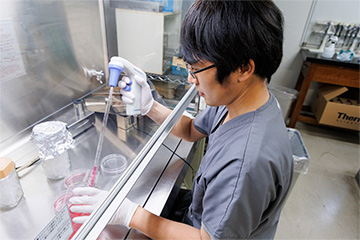
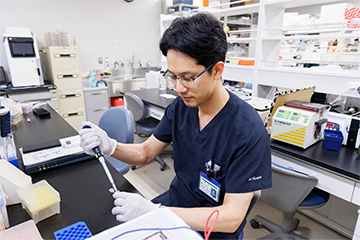
(Interviewed in July 2023)
Numerous study sessions that expose students to cutting-edge knowledge and technology
Our department offers many study sessions on introductory pathology, reading sessions of research papers, and study groups using textbooks on cancer and immunology. Research paper reading sessions allow one to read the latest papers published in leading journals such as Nature, Cell, and Science and be exposed to the latest topics. There are also lots of opportunities to learn diverse skills, such as presentations in English and studying on data analysis using R. Our department is in charge of “Medical Movies/Dramas/Novels/Manga Revisited with the Latest Medical Knowledge” in the university-wide Freshman Seminar. In addition to cutting-edge lectures by a wide variety of lecturers, the program includes multiple laboratory tours and group presentations based on medical dramas and movies, providing non-medical students with an opportunity to experience the latest in medicine and medical care. This course was selected for Excellent Teachers in a class survey of subjects of general education in FY 2022.



